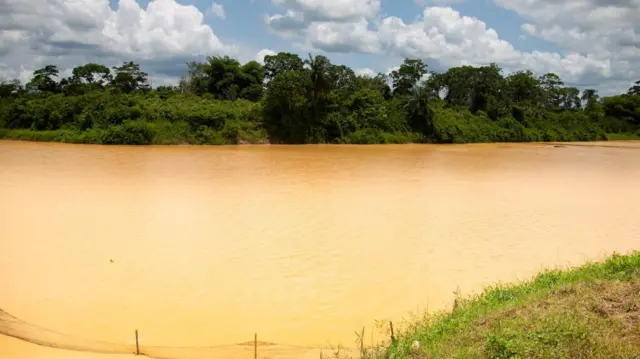adverts
The Ghana Coalition Against Galamsey (GCAG) has reiterated its call for urgent government intervention in the fight against illegal mining, or “Galamsey,” following alarming reports of environmental degradation and increased mining activities in critical water bodies.
The issue of illegal mining reached a tipping point in August 2024, when the Ghana Water Company Limited reported a dramatic deterioration in water quality, with turbidity levels at the Sekyere Hemang Water Treatment Plant soaring to 14,000 nephelometric turbidity units (NTU)—far above the World Health Organisation’s permissible limit of 5 NTU.
This disturbing revelation prompted swift action from various stakeholders, including the formation of the Ghana Coalition Against Galamsey in September 2024, which united civil society groups, labour organisations, business entities, faith-based organisations, youth groups, and academic institutions in a concerted effort to combat the galamsey menace.
adverts
The coalition’s advocacy led to significant measures, including the suspension of the operationalisation of L.I. 2462, the introduction of 100 military officers to protect key water bodies, and a national pledge signed by eight presidential candidates—including President John Dramani Mahama—committing to the fight against illegal mining.
Despite these efforts, the situation has worsened in recent months, with increased illegal mining activities exploiting leadership silence on the matter.
The coalition pointed to the recent tragic incidents in Ntrotroso and Obuasi as a stark reminder of the explosive threat posed by galamsey to national security and public safety.
“We fully support the independent investigation ordered by President Mahama into the recent tragic clashes, but these events highlight the urgency of addressing this crisis,” said Kenneth Ashigbey, convener of the Ghana Coalition Against Galamsey. “We are deeply concerned about the pace of government action, despite the issue being included in the President’s 120-day agenda.”
The GCAG has formally written to President Mahama, urging him to issue an immediate “cease-and-desist” order to all illegal miners and regulatory bodies, a decisive step to curb illegal mining activities while comprehensive long-term solutions are being developed.
As part of their advocacy, the coalition outlined several critical measures they believe the government must take to address the galamsey crisis:
- Declaration of a State of Emergency on Water Bodies: The President must declare a state of emergency on all water bodies, ordering the military to clear illegal miners from these areas. Mining on water bodies, they argue, is illegal and should not be tolerated.
- Immediate Halt to Mining Near Water Sources: All active and planned mining concessions overlapping with river buffers should be revoked, and all mining activities within a 100-meter buffer of rivers and streams must be halted immediately.
- Abrogation of Permits in Protected Forest Reserves: Since many water bodies originate in forest reserves, all mining permits issued in globally significant biodiversity areas (GSBAs) should be rescinded.
- Repeal of L.I. 2462: The coalition has called for the immediate repeal of L.I. 2462, which they believe has contributed to the worsening of the illegal mining situation.
The GCAG’s push for action comes in response to the growing environmental and social risks associated with galamsey.
The coalition remains committed to continued advocacy and the launching of further initiatives to rally public support and engage with the government in resolving the issue.
“We are open to discussions and solutions, but our position remains clear: we must take decisive action now,” Ashigbey said. “This is not just an environmental issue; it’s a national security threat that demands an immediate and unwavering response.”
The Ghana Coalition Against Galamsey is a broad alliance of organisations from diverse sectors, including media, civil society, business, academia, and youth groups. Their unified platform aims to combat illegal mining activities and ensure the sustainable management of Ghana’s natural resources.


